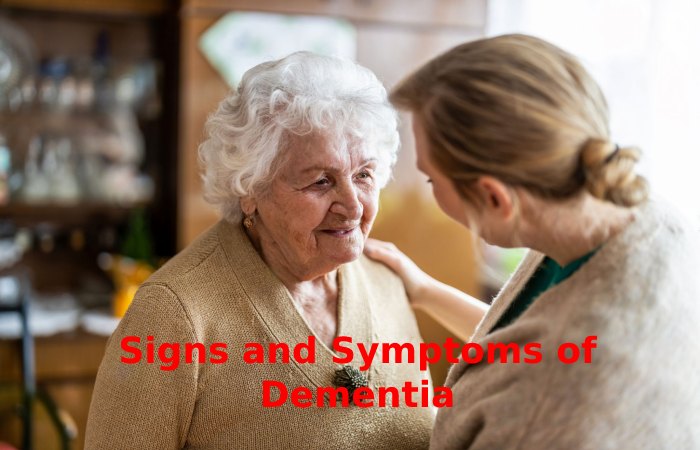Table of Contents
Introduction
Memory loss, personality changes, and decreased intellectual abilities are symptoms of dementia, which can be caused by brain disease or trauma. These changes are not typical of aging and significantly impact daily life, autonomy, and relationships.
According to Alzheimer’s Disease International, around 50 million people worldwide have dementia, with a new case being identified every 3.2 seconds. Although Alzheimer’s disease is the most communal form of dementia, other vascular and mixed dementias must be consider.
Signs and Symptoms of Dementia

Many of us experience memory lapses as we age. Realizing that something you took for granted isn’t working as well as it used to can be overwhelming and confusing. However, not all memory abnormalities indicate dementia, and dementia affects more than memory. The symptoms affect visual and spatial abilities, executive functions, language, emotions, and personality. In addition to memory loss, you must have deficits in at least one of four areas to meet the diagnostic criteria for dementia.
Here are Some of the Most Common Indications and Symptoms
- Memory loss is a common problem: Variations in short-term memorial, such as B. forgetting dates and events, needing more reminders, and repeating the same questions repeatedly.
- Impaired decision making: Being scam, donating money, or struggling to care for a pet.
- Problems with abstract thinking: Difficulty finding new ideas, solving puzzles, being creative, and carrying out daily activities.
- Lousy thought: Problem-solving, arithmetic, keeping a checkbook, and following instructions or recipes are areas where you may struggle.
- Inappropriate behavior: Inappropriate sexual expressions or actions and loss of inhibition.
- Communication skills deteriorate. It can be challenging to find words, follow discussions or follow actions.
- Confusion and disorientation: Getting lost in familiar places, worrying about remembering dates or seasons. I am not recognizing familiar faces or feel irritated by them.
- Walking, motor, and balance problems: The increase in falls or mishaps is due to a loss of coordination.
- Personal hygiene and safety are neglected: Neglecting personal hygiene, not dressing for the weather, and ignoring diet are examples of self-neglect.
- Personality develops over time: Withdrawal from social activities, listlessness or listlessness, insomnia, depression, hallucinations, paranoia, or agitation are symptoms of depression.
Causes of Dementia
Although the size and speed of a healthy brain decrease with age, this remarkable organ makes meaningful connections throughout life. When the connections between neurons are destroy due to inflammation, disease, or injury, the neurons die, and dementia develops. While losing one’s identity can be frightening, taking action early can drastically change the outcome.
Also Read: What is Rehab? – Everything you need to know
A Variety, Including, can cause dementia
- Strokes, for example, harm oxygen flow and deprive the brain of essential nutrients. In addition, reducing high blood pressure, treating heart disease, and quitting smoking can help prevent further strokes.
- Poor diet, dehydration, and the use of certain substances such as drugs and alcohol are factors. In addition, insulin resistance, metabolic issues, and vitamin deficiencies can be treat to minimize or eliminate symptoms of dementia.
- Brain damage can occur due to a single event or a series of events. In addition, cognitive abilities and memory can be affect depending on the location of the brain injury.
- Creutzfeldt-Jakob disease and HIV are infections or diseases that damage the central nervous system. Certain conditions can be treat, such as liver or kidney disease, depression-induced pseudo-dementia, and operable brain tumors.
Factors that Increase your Chance of Developing Dementia
Some risk factors for dementia are beyond your control. For example, you are more likely to develop dementia as you get older, if you have a family history of dementia, if you have had a brain injury, or if you have Down syndrome. However, other lifestyle issues, such as diet and activity level, may be more under your control.
Dementia is cause by a number of factors, including:
Heart Disease
Heart and brain health are intimately link. For example, high blood pressure, high cholesterol, atherosclerosis (narrowing of the arteries), heart disease, and stroke can increase the risk of it.
Diabetes
Poorly controlled diabetes can lead to stroke and heart disease and increase the risk of it, including vascular dementia, Alzheimer’s disease, and mixed dementia.
Smoking
Smoking increases the risk of cardiovascular disease, which increases the risk of mental decline and dementia.
Alcohol Abuse
Drinking too much or drinking too much alcohol can increase the risk of developing Alzheimer’s disease and other types of dementia, such as B. Korsakoff syndrome, a kind of diseases caused by excessive alcohol consumption.
Mental Health Has Been Neglected
Untreated depression, loneliness, social isolation, and lack of mental stimulation can increase the risk of dementia.
Conclusion
dementia is a group of conditions characterize by impairment of at least two brain functions, such as memory loss and judgement. Symptoms include forgetfulness, limited social skills, and impaired thinking abilities that interfere with daily functioning.
Also Read: What is a kidney Stone? – Types, Symptoms, and More
traumatic brain injury write for us
micropigmentation write for us
dentistry assistant write for us
laparoscopic surgery write for us
Can I have PCOS but not have any Symptoms
How to Convert 27 Celsius To Fahrenheit?
Telehealth Write For Us, GUEST POST, CONTRIBUTE AND SUMBIT POST

